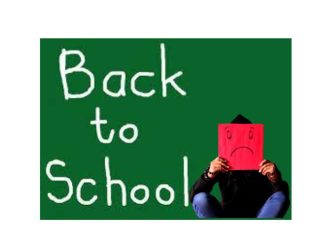
Why do we send our children to school? To learn stuff? What stuff? Who decides which “stuff” is important and which can be set aside? How do we know they learned this stuff? In the long past, education meant learning which plants wouldn’t kill you if you ate them, or the best way to plant a seed so that it would grow, or how to build a shelter that wouldn’t fall on your head as you slept, while, at the same time, keeping the “big bad wolf” out. It was about survival, and survival meant passing knowledge from one generation to the next. Staying alive meant you passed the test.
In class today, I don’t have to teach my students basic survival skills (although some kindergarten teachers may argue that teaching kids not to eat paste may fall into that category). In my English class, I’m charged with ensuring my middle school students know how to analyze a piece of literature for the author’s purpose, determine bias and reliability in nonfiction, and write an essay to justify their point of view about a topic. Did I decide that those are the important skills my students must have to succeed in the future? No, it wasn’t me.
Education Abducted
What I must teach in my class is determined by the Common Core State Standards developed in 2009 in response to failing reading and mathematical abilities in America’s schoolchildren compared to other nations. President Bush’s answer was the 2002 No Child Left Behind (NCLB) Act. This was followed by President Obama’s Race to the Top, which offered districts billions of dollars if they agreed to adopt certain education reforms based on testing. While both of these initiatives were developed out of a real concern for the education system, they did much to hinder and little to help.
The goal was to have every single child in America proficient in their grade level standards by 2014, a goal that most teachers knew was next to impossible. Once again, laws were passed and standards decided by a small group of people, most of whom had no significant time in a real classroom with real students. The professionals who know their clientele the best, the teachers, were, for the most part, left off the panel.
The Test is the Thing
How to determine whether or not these standards were met relied heavily on implementing standardized testing. The consequences for a school failing to meet the goals were severe and opened up a Pandora’s Box of troubles. Education historian Diane Ravitch points to these two programs as a cause for the “exodus of experienced educators, who were replaced in many districts by young, inexperienced, low-wage teachers; the closure of many public schools, especially in poor and minority districts…” as well as a myriad of other issues ranging from an expansion of for-profit charter schools to attacks on teachers’ unions.
Okay, so I get the idea behind the Common Core and don’t necessarily disagree with its intent. It is important to be able to look at how students are progressing. Using data to gauge strengths and weaknesses in some areas can help determine what needs to be taught to fill in certain gaps. But using one test as a way to judge an entire school is simply ridiculous. There are too many variables that affect the outcome of the test.
Out of My Control
The idea was having a set of standards that was taught nationwide would help guarantee that no matter where a child went to school, they would receive the same education. That is a nice thought, but it doesn’t consider that not all states spend educational dollars similarly. Or how much home environments can vary from place to place.
For example, I can control what information I present to the students. I can develop lessons to support the Common Core state standards. But I cannot control student absences, students whose families move often, or students who do not have parental support, have family issues or arrive 3 to 4 years below grade level in their reading ability. I can provide extra help after school, but the student must show up. I can call home to set up student conferences, but I have no control if the phone number doesn’t work. Look, I’m not trying to make excuses, but all of these issues can affect how much a student learns. Basing the effectiveness of a teacher or a school on the outcome of one test is not a good indicator of whether or not they did their job well.
A More Reasonable Approach?
Here’s what I think are some things to consider to make testing more useful:
- Stop using standardized tests as the sole way to determine the effectiveness of a school or a teacher. It is one part of what should be considered. Progress can also be assessed using a portfolio of work over time, as well as the student’s level of interpersonal skills, ability to collaborate, use creativity to problem solve, and attempts made to incorporate more challenging materials without giving up. These are abilities that cannot be determined by a computer-scored test but are skills that greatly improve a person’s chances of being successful.
- If we are going to use standardized tests, the same tests should be given at the beginning of the school year and at the end to see what progress has been made. The results used to judge my students’ progress are based on the test they were given the year before when they were with a different teacher at a different school. I don’t have any control over how well the student was taught the year prior, or how much they lost or gained over the summer.
- Students should be scored on how much they improved as individuals rather than how the school did as a whole. It is growth toward meeting a standard that should be measured. Although some students may recover from learning gaps, it is unfair to expect students who might come 3 to 4 years below grade level to perform at grade level by the end of a single school year.
- Standards should be adapted for the population that is being served. If the majority of my students are not at grade level, then it makes no sense for me to teach 7th-grade standards when they have not yet mastered the standards that came before. It is no wonder that students want to quit or begin to think of themselves as failures when they are being asked to build upon concepts they haven’t yet mastered.
- The first years of education are the most crucial. If a student isn’t mastering the standards in kindergarten, first, second, or third grade, the student should not be allowed to move on until those vital reading and number literacy skills are mastered. Otherwise, we are setting the student up for failure. There must be a limit to social promotion.
- Stop blaming poor student performance on educators. Yes, some people should definitely be removed from the profession for a variety of reasons, and yes, unions and tenure can impede the removal of those unworthy of the job. Blaming teachers for students not performing well on the state test is like blaming the doctor for a patient not losing weight. The doctor gives the information and the plan and is there for the patient to ask questions, but ultimately, it is up to the patient to do the work.
- Spend the billions of dollars used each year on state testing and all that goes with it to help decrease poverty, homelessness, and food insecurity. These issues have been shown to greatly affect the ability of students to do well in school.
Keep it in the Neighborhood
Ultimately, we all need to take responsibility for the education of our children. Some random group of disconnected bureaucrats shouldn’t be left to decide what kids need to know. While a set of national standards can be a guide, the local community should come together to determine how to implement them best. Business owners, parents, teachers, school administrators, and the school board should discuss what “stuff” our children really should be learning, how the standards fit into those expectations, and what to do if students fail to meet them.
The stuff that makes up a student’s success today is not based on knowing how to grow their own food or build their own houses. Today’s students need to learn how important it is to grow their intelligence and build a strong foundation upon which the success of everything else in their world will stand. State standards can certainly find a place somewhere in that stuff.
Well, that’s just my opinion, anyway…
Links to resources used in this week’s episode and this rant:
- Secretary DeVos Announces $3 Billion in Emergency Education Block Grants for Governors
- History of Standardized Testing in the United States
- Elementary and Secondary Education Act (ESEA) of 1965
- The Elementary and Secondary Education Act: 40 Years Later
- State Board of Education Members
- State Board of Education responsibilities
- Flyer for recruitment of teachers to score constructed
- Purpose of CAASPP according to CA dept of ED:
- Everything you need to know about Common Core — Ravitch
- Recruiting Educators for California Assessments
- Who Wrote the Common Core Standards? The Common Core 24
- https://dianeravitch.net/
- 7 Ways Poverty and Education are Related
- Six Ways the Common Core is Good For Students
- NEA President: We Need a Course Correction on Common Core
- Common Core Is Dead. Long Live Common Core.
- After 10 Years of Hopes and Setbacks, What Happened to the Common Core?
- Common Core Has Failed America’s Students
- What Are Some Pros and Cons of the Common Core State Standards?
- Common Core States 2020













